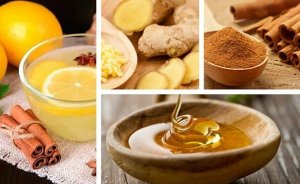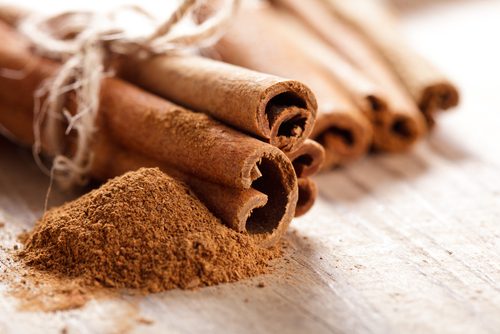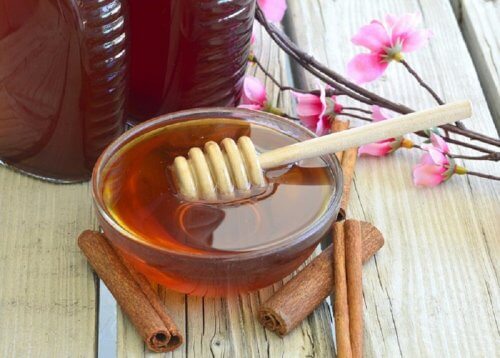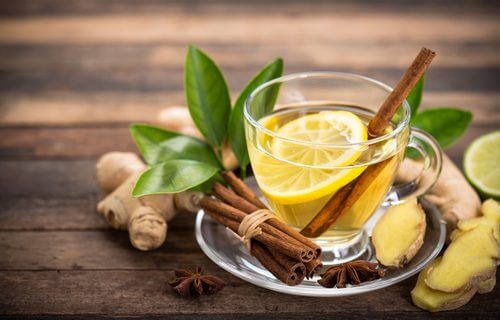Cinnamon and Ginger Drink to Get Rid of Coughs

Cinnamon and ginger are two very healthy medicinal spices. You can use them to get rid of coughs. In this article, you can learn how to make a homemade cinnamon and ginger drink that helps get rid of coughs, also learn all about their other health benefits.
Getting Rid of Coughs

There are many different natural remedies to get rid of coughs: medicinal plants, homeopathy, syrups, pastels, etc. However, there are also some homemade remedies you can make with cheap ingredients that are easy to get hold of.
Cinnamon
Cinnamon is an exotic and fine spice which is used in cooking all over the world. It can boost or sweeten the flavor of several sweets and desserts, such as biscuits, ice cream, puddings, creams, etc. It can also be used in a variety of stews with meat and fish.
However, little is known about their incredible health benefits:
- Soothes coughs and sore throats.
- Prevents colds and flu.
- Aids digestion and alleviates digestive problems such as gas, nausea, or heartburn.
- Reduces blood sugar levels. This makes it an excellent remedy for type-2 diabetics and people with insulin resistance.
- Reduces cholesterol.
- Fights infections.
- Has anti-inflammatory properties.
- Is an anti-oxidant.
- Is a natural stimulant with no side-effects.
In order to benefit from its maximum curative effect, the cinnamon should come from the Ceylon variety. Chinese cinnamon, on the other hand, is much less medicinal.

Ginger
Ginger is an exotic root which is spicy and refreshing. It’s used a lot in Asian cooking due to its digestive properties and it’s goes well in all kinds of dishes. Ginger is also good for absorbing nutrients, which makes it the perfect condiment to any meal.
Like cinnamon, ginger also has many great health benefits:
- Reduces congestion in the respiratory pathways, soothes coughs, and warms the throat.
- Has antibacterial properties.
- Reduces inflammation.
- Improves digestion, reduces gas, and soothes heartburn.
- Helps treat constipation.
- Stimulates the body and accelerates the metabolism.
- It’s an aphrodisiac.
- Encourages perspiration.
- Strengthens the immune system.
- Combats free radicals.
- Regulates the hormonal system in women.
Honey

A Drink to Get Rid of Coughs
Ingredients
- 1 stick of Ceylon cinnamon or a teaspoon of ground cinnamon (5 g)
- 1 piece of fresh root ginger or a teaspoon of ground ginger (5 g)
- Honey (to taste)
- 3 glasses of water (600 ml)
Preparation
You can use two options to make this drink to get rid of coughs. You can use cinnamon sticks or whole root ginger by boiling them in the water for 15 minutes. Then, let it sit for 10 minutes.
- On the other hand, if you use ground cinnamon and ginger, you only need to boil the water, add the cinnamon and ginger, and let it steep for 10 minutes. Either choice is really effective.
- When the drink is warm, sweeten it with honey to taste.

How to Take it
- You can drink it warm, or a tad bit hotter, but be careful not to burn yourself or irritate your throat.
- You should sip it slowly. You can likewise gargle it.
- Drink it on an empty stomach, and also in between meals.
- You can drink it for a few days as a preventative, or if you’re using it to treat an acute cough, use it until you notice any improvement.
All cited sources were thoroughly reviewed by our team to ensure their quality, reliability, currency, and validity. The bibliography of this article was considered reliable and of academic or scientific accuracy.
- Dezube R. Tos en adultos. Manual MSD. Consultado el 20 de febrero de 2023. https://www.msdmanuals.com/es/hogar/trastornos-del-pulmón-y-las-v%C3%ADas-respiratorias/s%C3%ADntomas-de-los-trastornos-pulmonares/tos-en-adultos#v1142961_es
- Goldman R. D. (2014). Honey for treatment of cough in children. Official Publication of the College of Family Physicians of Canada. 60 (12): 1107-1110. https://www.ncbi.nlm.nih.gov/pmc/articles/PMC4264806/
- Mayo Clinic. (2020). Tos. Consultado el 20 de febrero de 2023. https://www.mayoclinic.org/es-es/symptoms/cough/basics/definition/sym-20050846
- National Center for Complementary and Integrative Health. (2020). Cinnamon. U. S. Department of Health and Human Services. Consultado el 20 de febrero de 2023. https://www.nccih.nih.gov/health/cinnamon
- National Center for Complementary and Integrative Health. (2020). Ginger. U. S. Department of Health and Human Services. Consultado el 20 de febrero de 2023. https://www.nccih.nih.gov/health/ginger
- Rasheed N. (2020). Ginger and its active constituents as therapeutic agents: recent perspectives with molecular evidences. International Journal of Health Sciences. 14 (6): 1-3. https://www.ncbi.nlm.nih.gov/pmc/articles/PMC7644455/
- Rouhi, H., Ganji, F., & Nasri, H. (2006). Effects of Ginger on the improvement of asthma [the evaluation of Its treatmental effects]. Pak J Nutr, 5(4), 373-6.
- Samarghandian S, Farkhondeh T, et al. (2017). Honey and health: a review of recent clinical research. Pharmacognosy Research. 9 (2): 121-127. https://www.ncbi.nlm.nih.gov/pmc/articles/PMC5424551/
- Townsend E. A, Siviski M. E, et al. (2013). Effects of ginger and its constituents on airway smooth muscle relaxation and calcium regulation. American Toracic Society. 48 (2): 157-163. https://www.ncbi.nlm.nih.gov/pmc/articles/PMC3604064/
- Visweswara Rao P, Hua Gan S. (2014). Cinnamon: a multifaceted plant. Evidence Based Complementary Alternative Medicine. 2014: 642942. https://www.ncbi.nlm.nih.gov/pmc/articles/PMC4003790/
This text is provided for informational purposes only and does not replace consultation with a professional. If in doubt, consult your specialist.








